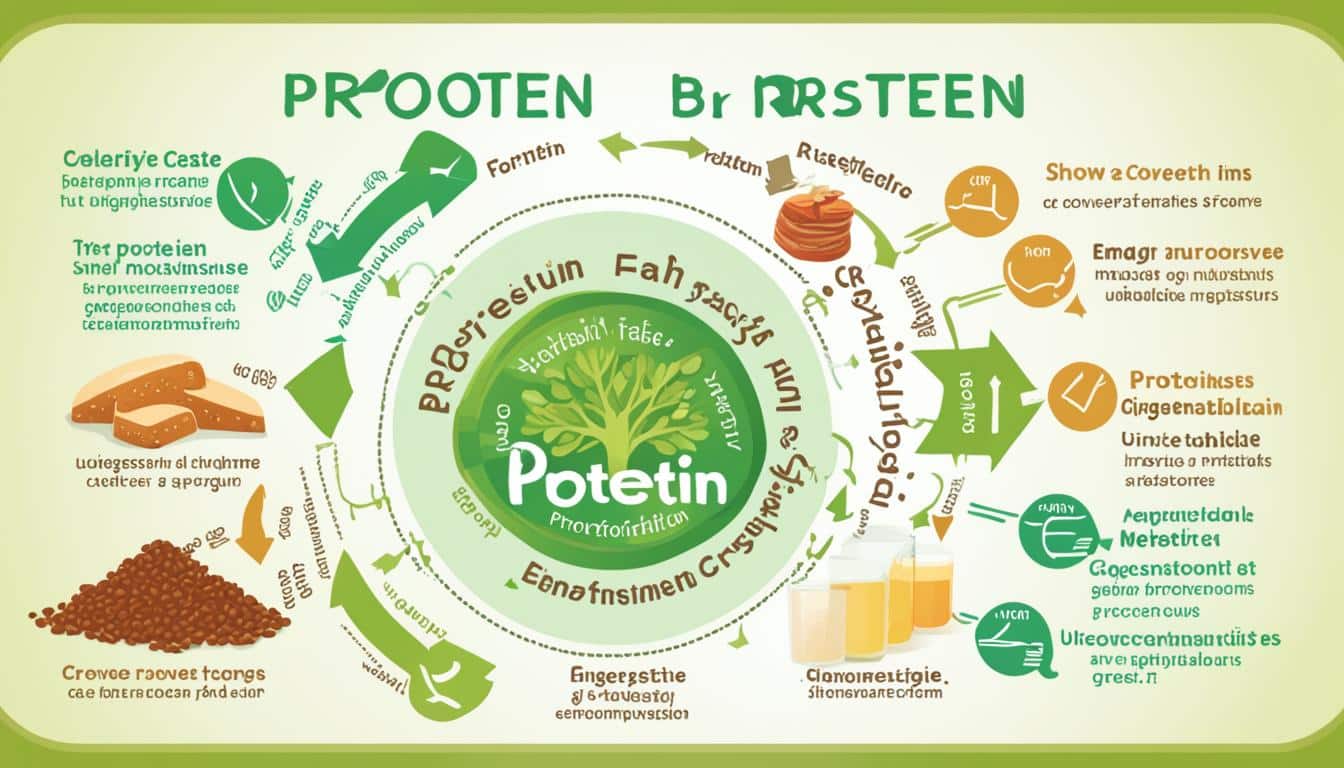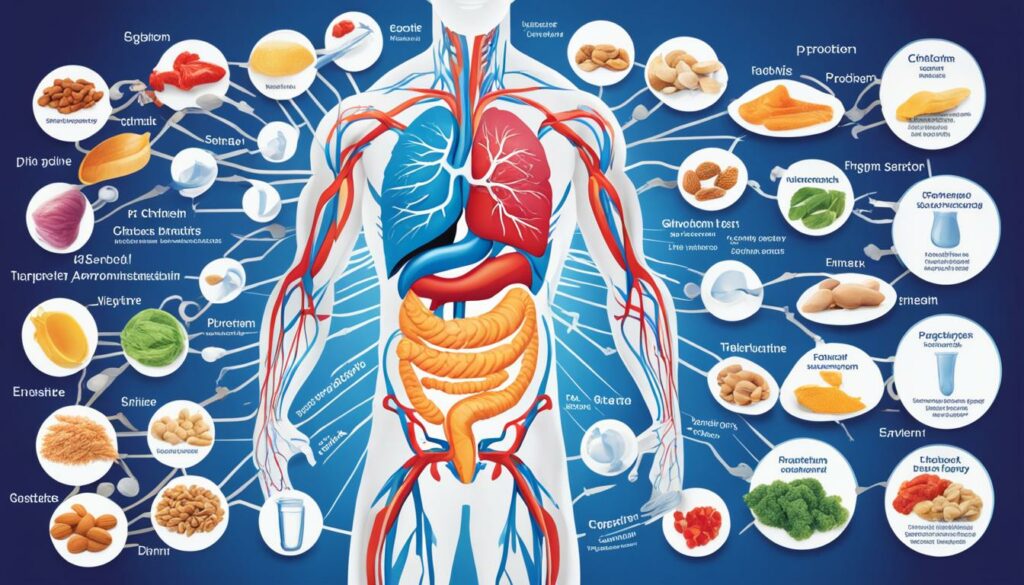
In the quest for weight loss and a faster metabolism, protein plays a crucial role. Understanding how protein helps break down fat and boost metabolism can empower individuals to make informed dietary choices. Research studies have highlighted the various mechanisms through which protein aids in weight management and fat oxidation.
Protein is known for its ability to increase satiety and reduce hunger. When consumed, it triggers the release of satiety hormones, such as GLP-1, peptide YY, and cholecystokinin, which signal a feeling of fullness and satisfaction. This leads to a decrease in appetite and a reduction in calorie intake, supporting weight loss efforts.
The digestion and metabolism of protein also require more energy compared to carbohydrates and fats. This is due to its higher thermic effect, whereby a significant portion of the calories consumed is burned during the process of digestion. In fact, protein can increase daily energy expenditure by approximately 80-100 calories, aiding in weight loss and management.
Furthermore, protein activates enzymes involved in fat metabolism, promoting the breakdown of stored fat and subsequent weight loss. By aiding in the release of fat breakdown enzymes, protein facilitates the utilization of fat as a source of energy, thus contributing to overall fat oxidation.
Key Takeaways:
- Protein increases satiety hormones and reduces appetite, aiding in weight loss.
- The digestion and metabolism of protein require more energy, leading to increased calorie burning.
- Protein activates enzymes involved in fat metabolism, facilitating fat breakdown.
- Incorporating protein into the diet supports overall weight management and metabolic health.
- Aim for a protein intake of 25-35% of total calories for optimal weight loss benefits.
The Effects of Protein on Hormonal Regulation of Weight
Protein plays a crucial role in the hormonal regulation of weight. It has a significant impact on satiety hormones and the overall appetite control system, making it a valuable nutrient for weight management.
When consumed, protein stimulates the release of satiety hormones such as GLP-1, peptide YY, and cholecystokinin. These hormones signal to the brain that the body is full and satisfied, reducing the feelings of hunger and preventing overeating.
At the same time, protein reduces the levels of the hunger hormone ghrelin. Ghrelin is responsible for stimulating appetite and increasing food intake. By decreasing ghrelin levels, protein helps decrease appetite and promote weight loss.
Another mechanism through which protein influences weight regulation is its higher thermic effect compared to carbohydrates and fats. The thermic effect of food refers to the energy expenditure required to digest and metabolize nutrients. Protein has a higher thermic effect, meaning that more calories are burned during the digestion and metabolism of protein compared to other macronutrients.
The protein digestion process also involves the activation of enzymes that break down fat. Digestive enzymes for fat breakdown are stimulated when protein is consumed, leading to increased fat oxidation and contributing to weight loss.
“Protein’s impact on satiety hormones and fat breakdown enzymes makes it an essential nutrient for appetite control and weight regulation.”
Overall, the effects of protein on hormonal regulation of weight are significant. It helps control appetite, reduces hunger hormone levels, increases satiety hormone levels, and promotes fat oxidation. Including adequate protein in the diet can support weight loss efforts and improve overall metabolic health.
The Role of Protein in Hormonal Regulation:
- Increases satiety hormone levels (GLP-1, peptide YY, cholecystokinin)
- Reduces hunger hormone levels (ghrelin)
The Thermic Effect of Protein:
- Higher thermic effect compared to carbohydrates and fats
- More calories burned during digestion and metabolism
Protein and Fat Breakdown:
- Protein stimulates fat breakdown enzymes
- Contributes to increased fat oxidation
Protein’s Impact on Energy Expenditure
When it comes to burning calories and increasing energy expenditure, protein plays a vital role. Its unique properties and metabolic effects make it an essential nutrient for those looking to burn fat and boost their metabolism.
One key factor contributing to protein’s impact on energy expenditure is its higher thermic effect compared to other macronutrients. The digestion and metabolism of protein require more energy, resulting in additional calorie expenditure. This means that your body burns more calories when digesting and metabolizing protein than it does when processing carbohydrates or fats.
In fact, research has shown that high protein diets can increase the amount of calories burned by approximately 80-100 calories per day. This calorie-burning effect can be even greater during periods of overfeeding, where the body has an excess of calories available.
| Protein | Carbohydrates | Fats | |
|---|---|---|---|
| Thermic Effect | 20-35% of calories | 5-15% of calories | 0-3% of calories |
Table: Thermic effect of macronutrients (percentage of calories burned during digestion and metabolism).
In addition to its thermic effect, protein also promotes the breakdown of fat. Enzymes involved in fat metabolism are activated when protein is consumed, supporting the breakdown and utilization of fats as a source of energy. This further contributes to increased energy expenditure and can help in burning fat.
To summarize, protein’s impact on energy expenditure is multifaceted. It not only has a higher thermic effect compared to other macronutrients but also activates fat breakdown enzymes, leading to increased calorie burning and fat utilization.

Stay tuned for the next section: Protein’s Role in Appetite Control
Protein’s Role in Appetite Control
When it comes to weight management, protein plays a crucial role in controlling appetite and supporting weight loss efforts.
One of the key benefits of protein is its ability to keep you feeling full and satisfied for longer periods. Research has shown that protein is highly satiating, reducing hunger and cravings, making it easier to adhere to a calorie-deficient diet.
Studies have actually found that high protein diets can automatically lead to a reduction in calorie intake, even without consciously restricting calories. This can be attributed to the satiety-promoting effects of protein, which help to naturally decrease overall food consumption.
Moreover, protein intake has been shown to decrease the desire for late-night snacking, which is often a major obstacle in weight management. By providing a feeling of fullness and satisfaction, protein can help curb those nighttime cravings and keep you on track with your weight loss goals.
The Importance of Protein for Weight Management
Including optimal amounts of protein in your diet is essential for effective weight management. Its ability to control appetite, reduce hunger, and decrease cravings can make a significant difference in your weight loss journey. By including protein-rich foods in your meals and snacks, you can support your efforts to reach and maintain a healthy weight.
| Benefits of Protein for Weight Management |
|---|
| Reduces hunger and cravings |
| Increases feelings of fullness and satisfaction |
| Automatically leads to lower calorie intake |
| Helps control late-night snacking |
Adding protein-rich sources to your meals and snacks can help you feel more satisfied, prevent overeating, and support your weight management efforts. Incorporating lean meats, poultry, fish, eggs, dairy products, legumes, nuts, and seeds into your diet can provide you with the protein you need for successful weight loss and maintenance.
With protein’s satiating effects and appetite control benefits, it is a valuable nutrient for anyone looking to manage their weight effectively.
Protein’s Impact on Body Composition and Weight Loss Maintenance
When it comes to achieving and maintaining a healthy body weight, protein plays a crucial role. Not only does it help preserve lean muscle mass during weight loss, but it also contributes to a higher metabolic rate, leading to increased calorie burning even at rest.
During weight loss, the body tends to break down both fat and muscle tissue. However, consuming an adequate amount of protein can help prevent excessive muscle loss. This is important because lean muscle mass is more metabolically active than fat tissue, meaning it burns more calories. By preserving lean muscle, protein helps ensure that your body continues to burn calories efficiently, promoting long-term weight loss maintenance.
In addition to preserving muscle, protein also aids in preventing weight regain after losing weight. One of the reasons for weight regain is increased appetite, as the body tries to regain lost fat. However, protein is highly satiating and can help reduce cravings and hunger. Consuming protein-rich foods can help you feel fuller for longer, which may result in a lower overall calorie intake. By sustaining satiety and reducing calorie consumption, protein plays a crucial role in preventing weight regain.
To understand the impact of protein on body composition and weight loss maintenance, let’s take a look at the following table:
| Group | Protein Intake | Lean Muscle Mass | Weight Loss Maintenance |
|---|---|---|---|
| Low Protein Group | Less than 15% of total calories | Decreased | Difficult to maintain weight loss |
| Moderate Protein Group | 15-25% of total calories | Maintained | Possible weight loss maintenance |
| High Protein Group | Above 25% of total calories | Maintained or Increased | Successful weight loss maintenance |
This table clearly illustrates the importance of adequate protein intake for maintaining lean muscle mass and sustaining weight loss. Individuals consuming a high-protein diet are more likely to maintain or even increase their lean muscle mass, leading to successful weight loss maintenance. On the other hand, those with a low protein intake may experience muscle loss and find it challenging to maintain their weight loss efforts.

By including protein-rich foods in your diet, such as lean meats, poultry, fish, eggs, dairy products, legumes, and tofu, you can optimize your body composition and support long-term weight loss maintenance.
Conclusion
Protein is a key player when it comes to breaking down fat and supporting weight management. Its numerous benefits, such as regulating appetite hormones and increasing energy expenditure, make it an essential nutrient for those aiming to shed pounds.
By incorporating adequate protein into your diet, you can tap into its fat-burning potential and enhance your weight loss journey. Protein not only helps you feel fuller for longer, but it also increases the number of calories you burn during digestion and metabolism.
Moreover, protein supports weight loss maintenance by preserving lean muscle mass and preventing the unwanted regain of lost weight. By including protein-rich foods in your meals and snacks, you can optimize your weight management efforts and improve your overall metabolic health.
FAQ
How does protein help break down fat and boost metabolism?
Protein helps break down fat and boost metabolism through various mechanisms such as increasing levels of satiety hormones, reducing hunger hormone levels, and increasing the thermic effect of food. It also activates enzymes involved in fat metabolism, contributing to fat oxidation and weight loss.
Does protein play a role in the hormonal regulation of weight?
Yes, protein plays a crucial role in the hormonal regulation of weight. It increases the levels of satiety hormones, such as GLP-1, peptide YY, and cholecystokinin, while reducing the levels of the hunger hormone ghrelin. This leads to a decrease in appetite and a reduction in calorie intake.
How does protein impact energy expenditure?
Protein increases energy expenditure and boosts calorie burning. This is due to factors such as protein’s higher thermic effect compared to other macronutrients. The digestion and metabolism of protein require more energy, resulting in additional calorie expenditure. High protein diets can increase the amount of calories burned by approximately 80-100 calories per day.
Does protein help control appetite?
Yes, protein is highly satiating and can help control appetite. It reduces hunger and cravings, making it easier to adhere to a calorie-deficient diet. High protein diets can automatically lead to a reduction in calorie intake, without the need for conscious calorie restriction. Protein also decreases the desire for late-night snacking.
How does protein impact body composition and weight loss maintenance?
Protein helps preserve lean muscle mass during weight loss, preventing muscle loss and ensuring a higher metabolic rate. This is important for long-term weight loss maintenance. Protein intake also plays a role in preventing weight regain after losing weight, as it helps sustain satiety and reduces the overall calorie intake.
Is protein important for weight management?
Yes, protein is a valuable nutrient for weight management. It helps regulate hormones involved in appetite control, increases energy expenditure, promotes fat breakdown, and supports weight loss and maintenance efforts. Including adequate protein in the diet is essential for optimal weight management and overall health.

